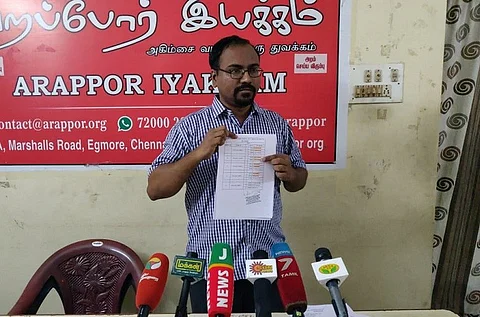

Not long after Arappor Iyakkam, a citizen’s rights group based in Chennai, exposed various levels of corruption in awarding infrastructure contracts by Chennai Corporation, further evidence on the collusion between parties bidding for tenders has been released. The new piece of evidence obtained by Arappor Iyakkam under RTI guidelines shows that the bids by multiple parties placed for various infrastructure contracts in Chennai were applied from the same IP address.
This revelation indicates that the bidding parties colluded with each other. While submitting the bids for the tenders, one of them acted as a dummy bidder. This ensures that the contract is awarded to the other party.
How contractors collude
Elucidating, Arappor Iyakkam said that the tender inviting bids for construction of stormwater drain at Mookambigai second main road and three other streets in Valasaravakkam were opened on September 11, 2018. The parties that had placed the bids for the tender were A Balaji, R Ramarao and Menakaa & Co. Of the three parties, A Balaji and R Ramarao filed their applications from the same IP address, clearly showing that the two bidders knew each other.
Similarly, for another project of constructing stormwater drains in a different area, the only two bidders for the project were Menakaa & Co and S Gowthaman, both submitting applications from the same IP address.
Collusion between bidders for the same project is considered as a fraudulent practice under the World Bank guidelines for procurement of goods and services and employing project management consultants using its funds. According to the guidelines, if any fraudulent practice in awarding contracts comes to light, it would lead to rejection, cancellation or even imposing sanctions on the bidder as the case may be.
The Tamil Nadu Urban Infrastructure Financial Services Limited (TNUIFSL), which provides funds for these contracts, has stated that it follows the guidelines set by the World Bank while procuring services and employing project consultants.
But this collusion and restriction of infrastructure work to two or three contractor firms are nothing new for the contract firms in Tamil Nadu. John, a contractor, whose family has been involved in undertaking government tenders for around 20 years, had earlier spoken to TNM and alleged that the Minister for Municipal Administration SP Velumani was using his own benami firms to usurp large tenders.
He had also said that apart from the three or four companies that regularly get chosen for government contracts, the other prominent players are given money to not submit bids for the tenders.
Speaking to TNM, Jayaram Venkatesan, the convenor of Arappor Iyakkam, said that what has been released by the collective was additional evidence to prove collusion in the bidding process.
“It is extremely clear now that there is a syndicate of contractors. We can see how relative parties bid and how they have formed cartels to ensure that they receive all the tenders. They are basically seated at same computers to do the bidding,” he says. He also adds that this violated the Tamil Nadu Transparency in Tenders Act, 1998 and the World Bank rules.
The Tamil Nadu Transparency in Tenders Act and Rules puts the onus of preventing conflict of interest between the bidders on the tender inviting authority. “It shall be the responsibility of Tender Inviting Authority and Tender Accepting Authority to ensure that the prospective tenderers do not have a conflict of interest that affects the Tender Proceedings,” it says.
According to the rules, an applicant is said to have conflict of interest if “such prospective tenderer, its member or any associate thereof, has a relationship with another prospective tenderer, or any associate thereof, directly or through common third party/parties, that puts either or both of them in a position to have access to each other’s information about, or to influence the response of either or each other.”
Similarly, Competition Act, 2002 also considers any agreement entered by an entity with cartels, engaged in identical or similar trade of goods or provision of services, which directly or indirectly results in bid rigging or collusive bidding, which results in an adverse effect on competition as anti-competitive in nature. It also says that agreements of such nature shall be void.
John also claims that in addition to allowing this collusion, the corporation further prevents other contractors from bidding for projects.
“Whenever we try to bid for a project, we won't even be able to download the specifications. If we do, then uploading our data becomes a task. And even if these hurdles are crossed, the corporation refuses to give us machinery certificates,” he says.
Arappor Iyakkam’s recent expose also implicates two project management firms that were chosen to offer consultancy services to the infrastructure contracts. According to the RTI response available with Arappor Iyakkam, VAX Consultants Pvt Limited and Megastar Survey and Consultants India Pvt Limited submitted their bids for two projects from the same IP address. Both the parties were selected for the job once the tenders were opened.
Speaking about companies that offer Project Management services, John says that even in this sector, the parties who are selected are already decided by the cartel. “Not only does the corporation allow for this cartel to decide who gets contracts but even the consultants, who are supposed to be independent bodies involved in project management, are fixed. The list shows that rival consultants, too, are bidding from the same system. There can't be bigger evidence than this of the corruption taking place in the tender process," he adds.
Arappor Iyakkam wrote a letter to Kakarla Usha, Managing Director of TNUIFSL, on Monday, requesting her to withhold the disbursal of funds to Chennai Corporation for certain projects and cancel the tenders. The organisation has also requested to blacklist all the contractors involved in cartels.